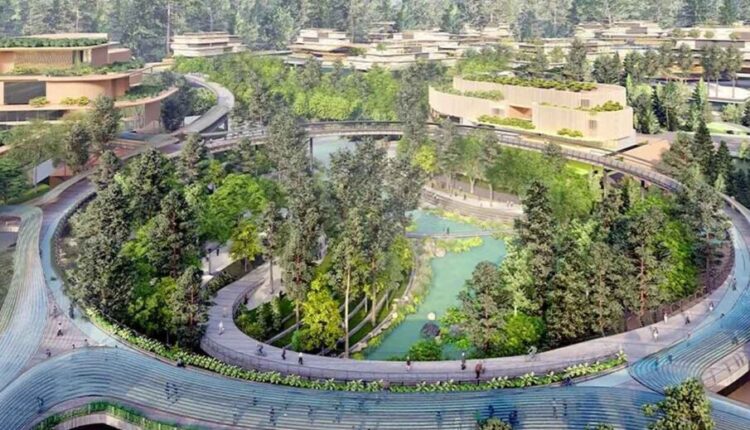The development of the IKN as a legacy of President Jokowi’s visionary leadership.
By: Aditya Hutomo*)
The development of the National Capital City (IKN) Nusantara in East Kalimantan is seen as a strategic step in creating a more efficient and sustainable government center. Many parties believe that this project reflects President Jokowi’s long-term vision to distribute economic and governmental centers outside of Java Island.
In a well-thought-out plan, the relocation of the capital aims to address various urbanization challenges in Jakarta, including traffic congestion and land subsidence. This project not only provides solutions to existing problems but also prioritizes sustainability by integrating green spaces and modern technology.
The significant development of toll roads during the two terms of President Jokowi’s leadership has become an important milestone in efforts to improve infrastructure in Indonesia. Through this program, Jokowi has succeeded in boosting connectivity between regions, which in turn is expected to enhance economic growth. However, the great challenge now rests on the shoulders of Prabowo Subianto’s government, which must continue this momentum.
Member of the BPJT from the Community Element, Tulus Abadi, stated that good infrastructure is a strategic investment. Nevertheless, he also reminded that the construction of toll roads does not automatically provide immediate benefits. The transition process is necessary so that its economic impact can be felt by the community. In this context, the continuity and sustainability of infrastructure become very crucial.
The Prabowo administration is expected not only to continue what has been built by Jokowi but also to create new strategies to enhance the movement of people across all toll roads. The increase in traffic on the toll road is expected to serve as a catalyst for local economic growth. The involvement of local governments and the private sector is also considered important to support the development of new economic centers and to maximize the potential of tourist destinations.
The development of the new capital city is expected to stimulate economic growth in the surrounding areas. Some economists predict that this project will create new jobs and attract larger investments. This demonstrates the government’s commitment to equalizing development across Indonesia, not just concentrated in one region.
From a social perspective, the relocation of the capital is also seen as an opportunity to create a more inclusive society. The plan for this new city development involves community participation in the planning process, so that the voices of the residents can be heard and accommodated.
Jokowi’s courage to move the capital city has received widespread support, especially from the people of East Kalimantan who feel proud that their region has been chosen as the location for the development of the new capital. The Chairman of the East Kalimantan Dayak Federation, Dr. H. Syaharie Ja’ang, expressed his appreciation for the success of Jokowi’s administration in building the new capital.
The development of the new capital city is expected to open up broader access to economic development in the region. The creation of job opportunities and the improvement of living standards have become a tangible hope for the people of East Kalimantan. Syaharie Ja’ang noted that the positive impacts of this project are already becoming visible, both economically and socially, and this has created a sense of pride among the local community.
However, the long-term success of the IKN is highly dependent on ongoing support from the government and active community involvement. It is important for the government to ensure that this project not only provides temporary benefits but also builds a strong foundation for the future. With the courage to take this bold step, Jokowi has positioned East Kalimantan as a new center of hope for more equitable development throughout Indonesia.
One of the main goals of relocating the capital is to reduce Indonesia’s dependence on Jakarta. As the center of government and economy, Jakarta faces many challenges, including traffic congestion, pollution, and land subsidence. By relocating the capital, Jokowi is striving to create balance among regions, allowing other areas to develop and attract investment.
One aspect that distinguishes the IKN is its focus on sustainability. The concept of an environmentally friendly city, with green open spaces and efficient resource management, has become a priority. By leveraging modern technology and best practices, IKN is expected to become a model for other cities in Indonesia and the world.
Meanwhile, challenges such as environmental management and meeting the basic needs of the community must also be addressed. A project of this magnitude is not without the potential social and environmental impacts that may arise. Therefore, a sustainable and inclusive approach is essential to ensure that the development of the new capital city not only brings economic benefits but also welfare for the local community.
With the courage to take this bold step, Jokowi has positioned East Kalimantan as a new center of hope for more equitable development throughout Indonesia. This project is a golden opportunity to demonstrate that equitable development is not just a slogan, but can be realized with the right policies and community support. The success of the IKN will be an important legacy that reflects the spirit of creating a more prosperous and just Indonesia.
President Jokowi is believed to want to leave a strong leadership legacy through the IKN, which is expected to become a symbol of innovation and courage in making significant decisions for the nation’s future. Over time, the success of this project is hoped to serve as an example for other development projects in Indonesia.
The author is a Public Security Analyst at the Center for Security and Order in the Archipelago. (PKKN)
